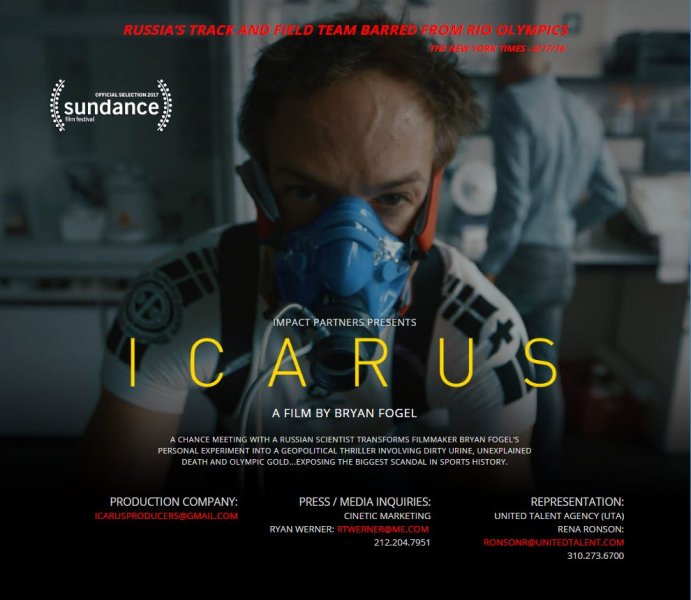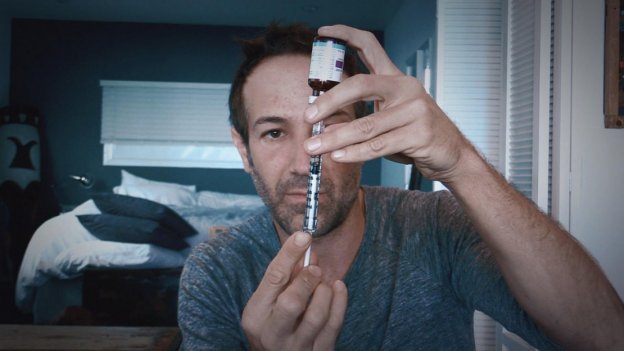“Icarus” is a new movie documentary about the Russian state-sponsored doping program and the mastermind behind it. The documentary has received a lot of critical acclaim with its entry in the U.S. Documentary Comeptition of the 2017 Sundance Film Festival. It premiered at the MARC Theatre in Park City, Utah on January 20, 2017.

ICARUS movie documentary featuring director and amateur cyclist Bryan Fogel with Russian doping mastermind Grigory Rodchenkov.
“Icarus” director Bryan Fogel is an amateur cyclist who, like many American cyclists, was inspired by Lance Armstrong. Fogel wasn’t just inspired to literally “ride the bike”. Armstrong also inspired Fogel to figuratively “ride the bike” in terms of using performance-enhancing drugs (PEDs) and methods to improve his performance.
“You could train harder and recover faster,” Fogel said. “But if you don’t have the genetics, all the drugs in the world aren’t going to make you Lance Armstrong.”
“Icarus” started out as one type of film and ended up being something quite different. As Variety Magazine pointed out, the film began as a self-experimentation type documentary in the style of Morgan Spurlock’s “Super Size Me” but pivoted into a cloak and dagger type film with the feel of Laura Poitras “Citizenfour”.
As an amateur cyclist, Fogel was disappointed with his 16th place finish in the seven-stage 2015 Haute Route road race through the Alps. He used Armstrong as his role model and wanted to use the same steroids, PEDs and blood doping procedures used by the seven-time Tour de France champion. In fact, Armstrong was cited again and again as his reference point for successful doping.
The Haute Route requests that all of its participants “rigorously undertake to respect the prohibition of doping and the provisions concerning anti-doping controls”. Since the Haute Route organizers reserve the right to carry out anti-doping controls at any time without notice, Fogel needed a doping expert to advise him on how to do this and go undetected on all drug tests just like Armstrong.
First, Fogel decided to Don Catlin, the world-renowned anti-doping scientist and founder of modern-day drug testing in sport. Although Catlin was intrigued by the goals of Fogel’s documentary project, the anti-doping crusader had spent most of his adult life attempting to stop athletes from doping. Consequently, Catlin ultimately declined to help Fogel citing ethical reasons. However, Catlin knew just the right person to help Fogel.
Catlin referred Fogel to the a Russian scientist named Dr. Grigory Rodchenkov. Rodchenkov was the director of the Moscow Anti-Doping Centre, a laboratory with the full-accreditation of the World Anti-Doping Agency (WADA) at the time. At the time of the referral, the scandal involving Russian state-sponsored doping was still months away. Catlin refused to explain how he knew about the corruption before the rest of the world knew about it.
“I could answer that question but it doesn’t make Grigory look good… I suggested [Fogel] speak with Grigory, which he did,” Catlin explained in a recent interview. “I have been involved with Russia for many, many years. It is a long story.”
Fogel apparently didn’t think too much of an anti-doping scientist actually helping him use PEDs to evade detection by drug testers at the Haute Route at first. Fogel consulted with Rodchenkov many times via Skype and during visits to Russia to discuss the finer points of steroid and PED use. It wasn’t until well into the filming of his documentary that Rodchenkov was actually the mastermind behind the systematic and state-sponsored doping program in Russia.
“[Rodchenkov] tells me he believes it is impossible to win a gold medal in Olympic Games, in any sport, without pharmacological help,” Fogel told Variety. “That was pretty amazing.”
After WADA released the results of an independent commission investigating Russian doping and exposed Rodchenkov asthe man in charge of helping Russian athletes use steroids without getting caught, Fogel realized he had a much, much bigger story for the subject of his documentary.
Rodchenkov admitted that the allegations against him were true in a New York Times report that was published in May 2016. Rodchenkov revealed the details behind the secret Russian steroid stack that he was supposedly undetectable when used in micro-doses. The “Duchess cocktail” was a steroid stack combining trenbolone, methenolone (Primobolan) and oxandrolone (Anavar). Rodchenkov mixed one milligram of steroid powder with one milliliter of alcohol. Rodchenkov used different alcoholic beverages based on gender – Chivas Scotch Whiskey for men and Martini Italian vermouth for women.
Rodchenkov took great pleasure becoming the star in Fogel’s cloak and dagger project. Fogel allegedly feared for his life presumably due to Russian assassins but Rodchenkov was just having fun. Fogel and his documentary became part of the anti-doping story when Fogel helped Rodchenkov defect to the United States. Fogel filmed Rodchenkov as he went through the process of entering the U.S. Witness Protection Program
Netflix subscribers will soon have the opportunity to watch the documentary. The streaming media and film production and distribution company purchased the international streaming video on demand rights for $5 million and a contested bidding war that included Amazon, Sony Pictures and Magnolia Pictures.
“This has been an intense 3.5-year personal journey that exposed the biggest scandal in sports history,” Fogel said in a statement. “To be able to work with Netflix, a company that is able to launch this story globally in such a big way, with such potential for social and political impact, is a spectacular honor.”
Sundance Live: Making "Icarus" – Canon Creative Studio
Sundance Live: Making “Icarus” – Canon Creative Studio
Gepostet von IndieWire am Dienstag, 24. Januar 2017
x

